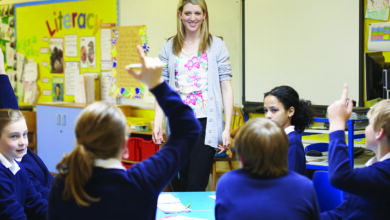
Imagine a classroom where educators confidently lead discussions on complex topics, address student misconceptions with ease, and seamlessly connect theory to real-world applications. This vision becomes reality when teachers possess deep content knowledge in their subject areas. But how do we equip educators with this invaluable expertise? Let’s explore the effectiveness of professional development programs specifically designed to enhance teacher content knowledge (TCK), fostering a vibrant learning environment for both students and educators with teacher capacity building programme.
Why Focus on Content Knowledge?
Strong TCK forms the bedrock of effective teaching. It empowers educators to:
- Deliver accurate and engaging instruction: They can explain concepts clearly, answer student questions confidently, and address misconceptions effectively.
- Design insightful learning experiences: With a firm grasp of subject matter, they can craft differentiated lessons that cater to diverse learning styles and challenge students at their appropriate levels.
- Inspire deeper student engagement: Their passion for the subject is contagious, igniting curiosity and a thirst for knowledge within their students.
- Stay current with evolving fields: Continuously updating their knowledge allows them to integrate the latest research and advancements into their teaching practices.
Beyond Lectures: Effective Program Designs for TCK Development
Traditional lectures and one-size-fits-all workshops have limited effectiveness in deepening TCK. Instead, consider these engaging and impactful approaches:
- Subject-specific content workshops: Led by experts in specific subject areas, these workshops delve into advanced topics, explore new pedagogies, and provide opportunities for active learning and collaboration.
- Inquiry-based learning communities: Teachers explore curriculum topics collaboratively, analyzing student misconceptions, researching best practices, and designing innovative lesson plans.
- Mentorship and peer coaching: Pairing experienced teachers with novice colleagues fosters personalized guidance, knowledge sharing, and reflection on instructional practices.
- Action research projects: Educators research specific challenges or best practices related to their subject area, applying new knowledge to improve their own teaching and sharing findings with colleagues.
- Online courses and resources: High-quality online platforms offer flexible, self-paced learning opportunities covering diverse subject areas and pedagogical approaches.
Beyond Programs: Supporting Continuous Learning
Effective TCK development extends beyond individual programs. Consider these additional strategies:
- Facilitate access to research and scholarship: Encourage subscriptions to academic journals, access to university libraries, and participation in conferences.
- Promote collaboration with content experts: Invite researchers, industry professionals, or external subject matter experts to share their knowledge with teachers.
- Create a culture of content inquiry: Encourage discussions about subject-specific challenges, celebrate intellectual curiosity, and reward engagement in ongoing learning.
- Support attendance at national and international conferences: Exposure to innovative practices and diverse perspectives broadens teachers’ knowledge base.
Conclusion: The Ripple Effect of Deep Content Knowledge
Investing in enhancing teacher content knowledge is not just a professional development initiative; it’s a catalyst for transformative change. As teachers embrace deeper understanding, they ignite a spark in their classrooms, fostering a love for learning, enriching student experiences, and ultimately preparing them for success in an ever-evolving world.
Frequently Asked Questions (FAQs)
Q: How can schools identify teacher needs for TCK development?
A: Conduct self-assessments, teacher surveys, classroom observations, and student learning data analysis to identify specific areas for improvement.
Q: How can the impact of TCK development programs be measured?
A: Track changes in teacher confidence, subject area knowledge, instructional practices, and student achievement data. Collect qualitative feedback through interviews and surveys with teachers and students.
Q: How can technology be used to support TCK development?
A: Utilize online platforms for accessing research articles, participating in virtual learning communities, and collaborating on content resources. Integrate technology tools to enhance lesson delivery and promote student engagement with complex subject matter.
Teachers play a pivotal role in student learning and development. However, many teachers, especially in underprivileged school districts, do not have opportunities to fully develop their own subject matter expertise. Teacher capacity building programmes that focus specifically on expanding teacher content knowledge can empower educators and improve student outcomes.
Strong teacher content knowledge (TCK) is the bedrock of effective instruction. It underpins educators’ ability to deliver accurate and engaging lessons, design insightful learning experiences, and ignite a passion for learning in their students. But how do we ensure educators possess the necessary subject-specific expertise? The answer lies in assessing teacher content knowledge gaps and needs. This involves a multi-faceted approach that identifies areas for improvement, informs professional development decisions, and ultimately fosters a thriving learning environment for both students and educators.
Why Assess TCK?
Regularly assessing TCK offers several significant benefits:
- Targeted Professional Development: By identifying specific knowledge gaps, professional development can be tailored to the precise needs of each educator, maximizing its impact.
- Enhanced Instructional Practices: Addressing knowledge gaps equips teachers with the confidence and expertise to deliver engaging and accurate lessons, leading to deeper student understanding.
- Improved Student Learning: Strong TCK translates into improved student achievement, as teachers can effectively guide students’ understanding of complex concepts and address misconceptions.
- Increased Teacher Confidence: Identifying and addressing knowledge gaps empowers educators, fostering a sense of professionalism and self-efficacy in the classroom.
- Data-Driven Decision Making: TCK assessments provide valuable data to inform school administration and policy decisions regarding curriculum development, resource allocation, and professional development initiatives.
Methods for Assessing TCK: A Multi-Pronged Approach
No single method perfectly captures the nuances of TCK. A comprehensive approach requires employing a combination of quantitative and qualitative assessments:
Quantitative Assessments:
- Standardized tests: Subject-specific standardized tests can provide a general overview of teachers’ content knowledge base. However, their limitations include focus on recall rather than application and potential lack of alignment with local curriculum.
- Content-specific assessments: Assessments developed by curriculum developers or educational experts can offer a more targeted evaluation of subject knowledge aligned with specific learning objectives.
Qualitative Assessments:
- Classroom observations: Observing teachers in action reveals their ability to explain concepts, answer student questions, and address misconceptions. It also provides insights into their pedagogical approaches and use of subject-specific vocabulary.
- Self-assessments: Teachers’ self-reflection on their strengths and weaknesses in specific content areas can offer valuable insights into their perceived needs and areas for improvement.
- Student interviews and surveys: Gathering feedback from students about their perceptions of their teachers’ subject knowledge can reveal areas where clarity or deeper understanding might be needed.
- Analysis of student work: Examining student work products can shed light on the effectiveness of instruction and potential areas where the teacher’s own subject knowledge might need reinforcement.
Beyond Assessment: Putting Data into Action
Once TCK gaps and needs are identified, the real work begins:
- Targeted professional development: Based on assessment findings, design professional development opportunities that address specific knowledge gaps, utilizing diverse formats like workshops, mentoring programs, online learning modules, or action research projects.
- Collaborative learning communities: Foster teacher collaboration through subject-specific communities where educators can share resources, discuss challenges, and learn from each other’s expertise.
- Mentorship and peer coaching: Connect experienced educators with less experienced colleagues to provide personalized guidance, feedback, and support in strengthening subject knowledge.
- Access to research and resources: Ensure teachers have access to current research papers, subject-specific databases, and professional learning resources to support continuous learning.
- Curriculum review and alignment: Assess alignment between curriculum expectations and teacher knowledge base. Consider adjustments to curriculum or professional development opportunities if needed.
The humanities and languages open doors to understanding different cultures, exploring diverse perspectives, and navigating the complexities of the human experience. But mastering these subjects requires more than memorization and rote learning. It demands critical thinking, creative expression, and a constant curiosity about the world around us. So, how can we ignite this passion for knowledge and empower students to truly master humanities and language content?
Beyond Textbooks: Building a Rich Learning Environment
Creating a vibrant learning environment goes beyond traditional teacher-centered instruction. Here are some strategies to activate deeper engagement:
- Project-based learning: Immerse students in real-world problems and historical scenarios, encouraging them to research, analyze, and interpret information. Imagine students creating exhibits analyzing historical figures, designing solutions to social issues, or developing multimedia presentations on literary themes.
- Collaborative learning: Foster group discussions, debates, and peer review activities to hone communication skills and cultivate diverse perspectives. Students can analyze primary sources together, write collaborative stories, or debate historical events from different viewpoints.
- Technology integration: Leverage technology tools to enhance learning experiences. Utilize online simulations, historical databases, digital storytelling platforms, and language learning apps to engage students in interactive and personalized learning.
- Community partnerships: Connect with local museums, archives, cultural institutions, or author visits to bring humanities and languages to life. Imagine students analyzing artifacts firsthand, interviewing community members about their heritage, or attending interactive workshops led by cultural experts.
-
Unleashing Student Autonomy: Supporting Active Content Exploration
Beyond engaging activities, empower students to take ownership of their learning:
- Student-led inquiries: Encourage students to explore topics that pique their curiosity, guiding them in research methods and independent learning. Imagine students choosing historical figures to research, language exchange partners to connect with, or creative writing projects to pursue.
- Differentiation and personalization: Tailor instruction and assessments to cater to individual learning styles, interests, and needs. Utilize different text formats, learning activities, and assessment methods to ensure access and success for all students.
- Formative assessment and feedback: Regularly assess student understanding and provide constructive feedback that guides further learning. Utilize self-reflection exercises, peer feedback sessions, and one-on-one conferencing to support progress.
- Metacognition development: Teach students self-regulation and learning strategies to become independent learners. Help them set goals, monitor their progress, and reflect on their strengths and areas for improvement.
Also read- https://articlesall.com/the-best-fonts-for-t-shirt-printing-a-comprehensive-guide/






